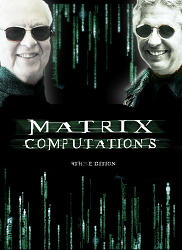
Matrix Computations
David Gleich
Purdue University
Fall 2023
Course number CS-51500
Tuesday-Thursday 1:30-2:45pm. Hampton 2123
Matrix Computations
Annoucements
- 2023-11-20
- Homework 6 posted.
- 2023-11-08
- Homework 5 posted.
- 2023-10-24
- Homework 4 posted.
- 2023-10-11
- Homework 3 posted. This is due soon!
- 2023-09-26
- Homework 3 posted.
- 2023-09-11
- Homework 2 posted.
- 2023-08-29
- Homework 1 posted.
- 2023-08-21
- Welcome! Please browse around the website. It's rather complete this year with lots of videos and notes from past years because we are teaching the class a slightly different way. Syllabus update still pending. Videos should all be there, see campuswire for login information.
Overview
Here's what the Registrar says:
Direct and iterative solvers of dense and sparse linear systems of equations, numerical schemes for handling symmetric algebraic eigenvalue problems, and the singular-value decomposition and its applications in linear least squares problems. Typically offered Spring.
Obviously, this course is being held in the fall, not the spring. We will mainly focus on dense and sparse linear systems. This will include a study of conditioning and error analysis in the dense case, and convergence in the sparse case. We will study on the other topics as well, but they will receive comparatively less treatment. I will try and highlight recent research and developments when it is relevant to the current lectures.
Books and reading materials
The following two textbooks are highly recommended. They are officially required, but you won't need them for the statement of any homework problems.
Matrix Methods and Programs. David F. Gleich -- working notes for this class.
Matrix Computations. Gene H. Golub and Charles van Loan. 4th Edition, Johns Hopkins University Press.
Numerical Linear Algebra with Julia. Eric Darve and Mary Wootters.
Numerical Linear Algebra. Lloyd N. Trefethen and David Bau. SIAM
See the readings page for additional reference
Coursework
This is a lecture class using a flipped classroom model. You (the student) will be expected to watch lecture videos and participate in class discussions. There will be regular homeworks. There will also be a midterm and a final.